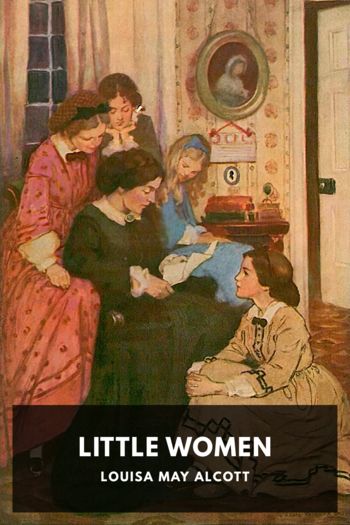Little Women - Louisa May Alcott (the beach read .TXT) 📗

- Author: Louisa May Alcott
Book online «Little Women - Louisa May Alcott (the beach read .TXT) 📗». Author Louisa May Alcott
The poor man was very uncomfortable, for the children had bereft him of his wife; home was merely a nursery, and the perpetual “hushing” made him feel like a brutal intruder whenever he entered the sacred precincts of Babyland. He bore it very patiently for six months, and, when no signs of amendment appeared, he did what other paternal exiles do—tried to get a little comfort elsewhere. Scott had married and gone to housekeeping not far off, and John fell into the way of running over for an hour or two of an evening, when his own parlor was empty, and his own wife singing lullabies that seemed to have no end. Mrs. Scott was a lively, pretty girl, with nothing to do but be agreeable, and she performed her mission most successfully. The parlor was always bright and attractive, the chessboard ready, the piano in tune, plenty of gay gossip, and a nice little supper set forth in tempting style.
John would have preferred his own fireside if it had not been so lonely; but as it was, he gratefully took the next best thing, and enjoyed his neighbor’s society.
Meg rather approved of the new arrangement at first, and found it a relief to know that John was having a good time instead of dozing in the parlor, or tramping about the house and waking the children. But by and by, when the teething worry was over, and the idols went to sleep at proper hours, leaving mamma time to rest, she began to miss John, and find her workbasket dull company, when he was not sitting opposite in his old dressing-gown, comfortably scorching his slippers on the fender. She would not ask him to stay at home, but felt injured because he did not know that she wanted him without being told, entirely forgetting the many evenings he had waited for her in vain. She was nervous and worn out with watching and worry, and in that unreasonable frame of mind which the best of mothers occasionally experience when domestic cares oppress them. Want of exercise robs them of cheerfulness, and too much devotion to that idol of American women, the teapot, makes them feel as if they were all nerve and no muscle.
“Yes,” she would say, looking in the glass, “I’m getting old and ugly; John doesn’t find me interesting any longer, so he leaves his faded wife and goes to see his pretty neighbor, who has no incumbrances. Well, the babies love me; they don’t care if I am thin and pale, and haven’t time to crimp my hair; they are my comfort, and some day John will see what I’ve gladly sacrificed for them, won’t he, my precious?”
To which pathetic appeal Daisy would answer with a coo, or Demi with a crow, and Meg would put by her lamentations for a maternal revel, which soothed her solitude for the time being. But the pain increased as politics absorbed John, who was always running over to discuss interesting points with Scott, quite unconscious that Meg missed him. Not a word did she say, however, till her mother found her in tears one day, and insisted on knowing what the matter was, for Meg’s drooping spirits had not escaped her observation.
“I wouldn’t tell anyone except you, mother; but I really do need advice, for, if John goes on so much longer I might as well be widowed,” replied Mrs. Brooke, drying her tears on Daisy’s bib, with an injured air.
“Goes on how, my dear?” asked her mother anxiously.
“He’s away all day, and at night, when I want to see him, he is continually going over to the Scotts’. It isn’t fair that I should have the hardest work, and never any amusement. Men are very selfish, even the best of them.”
“So are women; don’t blame John till you see where you are wrong yourself.”
“But it can’t be right for him to neglect me.”
“Don’t you neglect him?”
“Why, mother, I thought you’d take my part!”
“So I do, as far as sympathizing goes; but I think the fault is yours, Meg.”
“I don’t see how.”
“Let me show you. Did John ever neglect you, as you call it, while you made it a point to give him your society of an evening, his only leisure time?”
“No; but I can’t do it now, with two babies to tend.”
“I think you could, dear; and I think you ought. May I speak quite freely, and will you remember that it’s mother who blames as well as mother who sympathizes?”
“Indeed I will! Speak to me as if I were little Meg again. I often feel as if I needed teaching more than ever since these babies look to me for everything.”
Meg drew her low chair beside her mother’s, and, with a little interruption in either lap, the two women rocked and talked lovingly together, feeling that the tie of motherhood made them more one than ever.
“You have only made the mistake that most young wives make—forgotten your duty to your husband in your love for your children. A very natural and forgivable mistake, Meg, but one that had better be remedied





Comments (0)